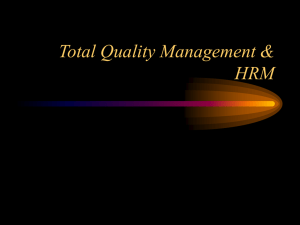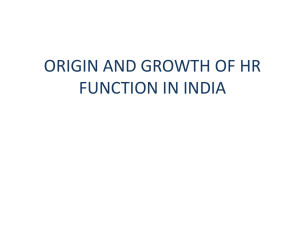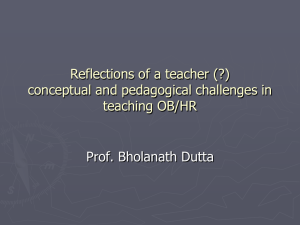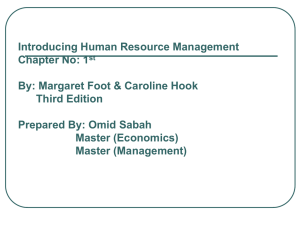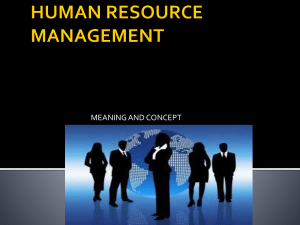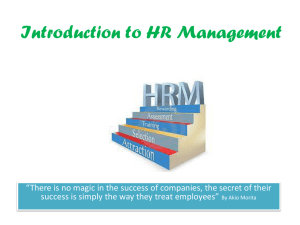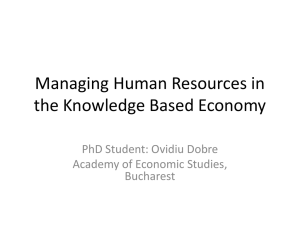HUMAN RESOURCE MANAGEMENT
advertisement
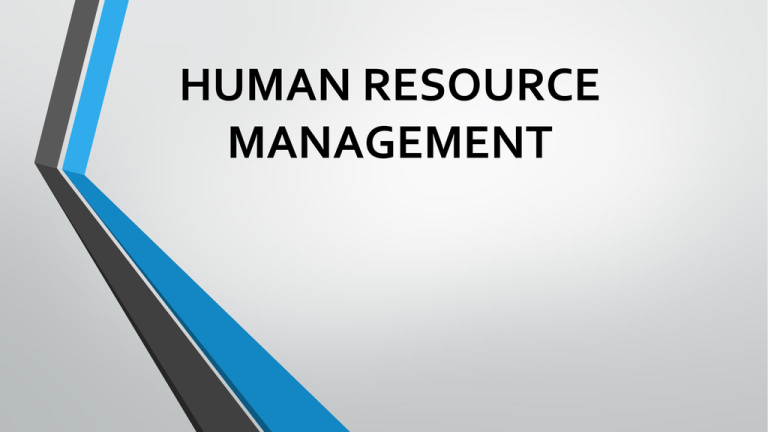
HUMAN RESOURCE MANAGEMENT HUMAN RESOURCE MANAGEMENT • “Human” represents the dimension of HRM which relates to the soft aspect such as commitment through participation and the most important aspect being the employees. • “Resource "represent the hard aspects such as strategy link of HRM and the importance of efficient utilization of employees. • “Management” represent the role of HRM as part of management that implies that it is not only an administrative function that carries out the formulated policies but also a managerial function that contribute to strategy formulation. HUMAN RESOURCE MANAGEMENT • • HRM is the part of the organization that is concerned with the ‘people’ dimension.HRM deals with human relations of an organization starting from recruitment to labor relation. It is a process of acquisition , development, motivation and maintenance of human resource of an organization. Human resource management may be defined as a set of policies, practices, and programmes designed to maximize both personal and organizational objectives.it is a process by which the people and the organizations are bound together in such a way that both of them are able to achieve their objectives. DEFINITION According to Flippo , “Human resource management is the planning, organizing, directing and controlling of the procurement, development , compensation , integration , maintenance , and reproduction of human resources to the end that individual, organizational and societal objectives are accomplished.” NATURE OF HRM • Integral part of process of management. • Comprehensive function. • Pervasive function. • People oriented. • Based on human relations. • Continuous process. • Science as well as art. SCOPE OF HRM EMPLOYEE HIRING EMPLOYEE AND EXECUTIVE REMUNERATION INDUSTRIAL RELATIONS HUMAN RESOURCE MANAGEMENT EMPLOYEE MAINENANCE EMPLOYEE MOTIVATION IMPORTANCE OF HRM • Importance for organization: Good human resource practices help in attracting and retaining the best people in the organizations. In order to make use of latest technology the appointment of right persons is essential and this happens only when management performs its HR function satisfactorily. The performance of the company depends upon the qualities of the people employed . this has further increased the importance of HRM. Human resource development is essential for meeting the challenges of future Importance for Employees • Effective management of human resource promotes team work and team spirit. • It encourages people to work with diligence and commitment. • HRM stresses on the motivation of employees by providing them various financial and non financial incentives. OBJECTIVES OF HRM PERSONAL OBJECTIVES FUNCTIONAL OBJECTIVES ORGANISATIONAL OBJECTIVES SOCIETAL OBJECTIVES Functions of HRM Functions of HRM may be broadly divided into two categories: • Managerial functions • Operative funtions Managerial functions The basic managerial functions are: • Planning • Organizing • Directing • controlling Operative Functions 1. Procurement : Job analysis Human resource planning Recruitment Selection Placement Induction and orientation Internal mobility 2. Development • • • • Training. Executive development. Career planning and development. Human resource development. 3. Motivation and compensation •Job design. •Work scheduling •Motivation •Job evaluation •Performance appraisal •Compensation administration •Incentives and benefits 4. Maintenance: • • • Health and safety Employee welfare Social security measures 5 .Integration function: • Grievance redressal. • Discipline. • Teams and team work. • Collective bargaining. • Employee participation and empowerment. • Trade unions and employee associations. • Industrial relations. Emerging Issues of HRM • • • • • • • Personnel records Human resource audit Human resource research Human resource accounting Human resource information system Stress and counselling International human resource management.


